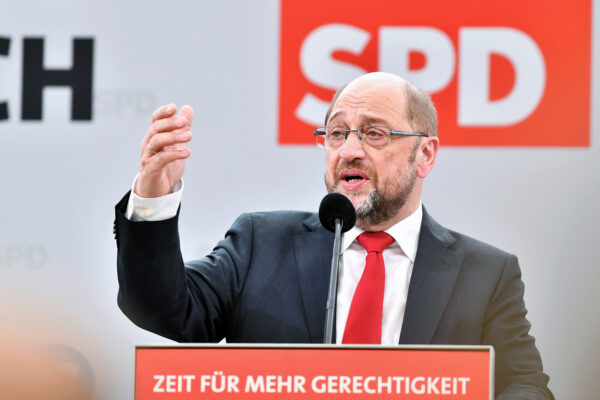
Germany’s Martin Schulz looks less and less like the savior of European social democracy.
His party performed poorly in North Rhine-Westphalia on Sunday, the third state election this year in which the Social Democrats were bested by Angela Merkel’s Christian Democrats.
I argued here earlier in the week that North Rhine-Westphalia’s election was a crucial test for Schulz. It is the heartland of German social democracy: the biggest industrial state with four of Germany’s ten largest cities and a long history of trade unionism. The state has been governed by a coalition of Social Democrats and Greens since 2010 under a popular state prime minister, Hannelore Kraft.
If Schulz couldn’t win here, then where can he?
Culture war
We’ll have to wait for detailed results before making definitive statements, but it looks like Schulz’s strategy of simultaneously appealing to what I call “blue” and “red” voters didn’t pay off.
Social democrats across Europe are caught in the middle of the blue-red culture war: they have middle-class voters with liberal economic and social views (“blues”) and working-class voters with socially conservative views and economically protectionist instincts (“reds”). It is hard to devise a program that speaks to both constituencies. Their interests and opinions are opposite in many ways.
Social democrats who pick sides do well. Italy’s Matteo Renzi and France’s Emmanuel Macron have both sided with “blue” voters and won.
Parties that try to have it both ways tend to fail. The French Socialist Party and the Dutch Labor Party could not bring themselves to abandon working-class voters and ended up satisfying no one. Cosmopolitans switched to pro-European and Green parties; traditional social democratic voters defected to nationalists on the far left and the far right.
Left-wing defeat
Germany’s Social Democrats looked like the exception. Schulz, a former European Parliament chief, drew support from across the political spectrum when he became party leader in January. Cosmopolitans applauded his European vision; blue-collar voters admired the fact that he had risen from a modest background.
Yet few are voting for him.
According to preliminary results, the Social Democrats have fallen from 39 percent support in North Rhine-Westphalia five years ago to 31 percent. The Christian Democrats are seen going up from 26 to 34 percent support.
The far-left Die Linke is at 5 percent support in the latest projection. If it falls below that threshold, it would not qualify for seats in the regional legislature and the Christian Democrats would be able to form a majority government with their preferred coalition partner, the liberal Free Democrats — making the left’s defeat complete.
